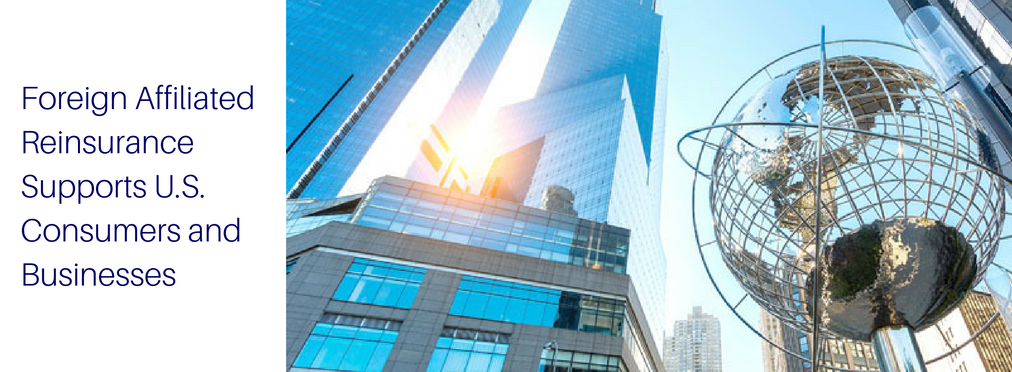Foreign Affiliated Reinsurance Supports U.S. Consumers and Businesses
Share this

Global insurance providers like Zurich, play an important role in the U.S. economy by helping U.S. businesses and communities protect themselves from a number of risks such as natural catastrophes and terrorism incidents. In fact, every day the world faces risks that are often too expensive or concentrated for local insurers to cover. Recent analysis from Guy Carpenter indicates approximately 70 percent of the global economic losses from natural catastrophes were uninsured between 1980 and 2013.
Central to domestic and global companies’ ability to effectively manage risk is reinsurance, or “insurance for insurers.” Reinsurance allows insurance providers to more effectively diversify risks. For global insurance providers in particular, reinsurance enables these providers to best deploy capital to write risk-reducing and cost-effective policies and pay out claims in major catastrophes, such as 9/11, Hurricane Katrina and Hurricane Sandy. According to the Coalition for Competitive Insurance Rates, global insurance providers paid an estimated 64 percent of the claims following 9/11, and almost half of losses insured during Hurricane Sandy.
Unfortunately, recently introduced legislation in Congress takes specific aim at global insurance providers, proposing a discriminatory tax targeting the use of these legitimate risk transfer mechanisms. The legislation seeks to deny globally-based U.S. insurance providers a tax deduction for certain reinsurance premiums paid to international affiliates – even though these providers are already being held to the same laws as their U.S. competitors.
We believe this tariff will only serve to harm U.S. consumers and businesses, while reducing GDP growth. A study conducted by the Brattle Group found previously proposed similar legislation would cause American consumers to pay $11 to $13 billion more for current insurance coverage. This effect may be particularly felt in areas most vulnerable to natural disasters where reinsurance is so critical.
Many industry leaders, lawmakers, researchers and regulators agree: tax proposals against reinsurance simply miss the mark. Reinsurance is crucial to sharing global risks efficiently and helping keep insurance costs low for U.S. businesses and consumers.
For more information, please go to our Foreign Affiliated Reinsurance page on Zurich Advocacy.
Foreign Affiliated Reinsurance Supports U.S. Consumers and Businesses
Share this

Global insurance providers like Zurich, play an important role in the U.S. economy by helping U.S. businesses and communities protect themselves from a number of risks such as natural catastrophes and terrorism incidents. In fact, every day the world faces risks that are often too expensive or concentrated for local insurers to cover. Recent analysis from Guy Carpenter indicates approximately 70 percent of the global economic losses from natural catastrophes were uninsured between 1980 and 2013.
Central to domestic and global companies’ ability to effectively manage risk is reinsurance, or “insurance for insurers.” Reinsurance allows insurance providers to more effectively diversify risks. For global insurance providers in particular, reinsurance enables these providers to best deploy capital to write risk-reducing and cost-effective policies and pay out claims in major catastrophes, such as 9/11, Hurricane Katrina and Hurricane Sandy. According to the Coalition for Competitive Insurance Rates, global insurance providers paid an estimated 64 percent of the claims following 9/11, and almost half of losses insured during Hurricane Sandy.
Unfortunately, recently introduced legislation in Congress takes specific aim at global insurance providers, proposing a discriminatory tax targeting the use of these legitimate risk transfer mechanisms. The legislation seeks to deny globally-based U.S. insurance providers a tax deduction for certain reinsurance premiums paid to international affiliates – even though these providers are already being held to the same laws as their U.S. competitors.
We believe this tariff will only serve to harm U.S. consumers and businesses, while reducing GDP growth. A study conducted by the Brattle Group found previously proposed similar legislation would cause American consumers to pay $11 to $13 billion more for current insurance coverage. This effect may be particularly felt in areas most vulnerable to natural disasters where reinsurance is so critical.
Many industry leaders, lawmakers, researchers and regulators agree: tax proposals against reinsurance simply miss the mark. Reinsurance is crucial to sharing global risks efficiently and helping keep insurance costs low for U.S. businesses and consumers.
For more information, please go to our Foreign Affiliated Reinsurance page on Zurich Advocacy.



